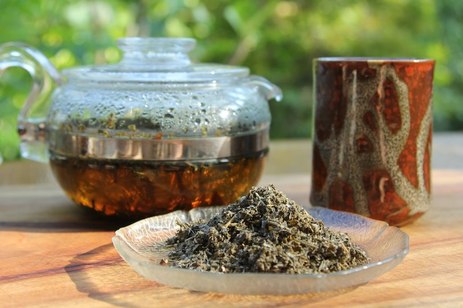
I personally love a cup of herbal tea. In fact, while I write, I am drinking a cup right now (it’s a special blend which I’ll share soon). I love how good it tastes and knowing it has medicinal benefits means I'm helping my body in more ways than one!
Pregnancy is a wonderful time to take extra care to nurture yourself. It's double the reason to be kind and healthy. Not only do you benefit, but your baby enjoys the rewards too.
With all the conflicting information out there about using natural remedies in pregnancy, it can be confusing to know what you can and can't do. I’d like to share some of the many benefits of using Red Raspberry Leaf (Rubus Idaeus) tea.
How is red raspberry leaf tea useful?
Red raspberry leaf has a long history with some sources dating its use back thousands of years. Today, it is one of the most commonly sought after herbs for use in pregnancy and it is becoming more popular and mainstream.
It's main action is to strengthen, nourish and tone the uterine muscles. It is also rich in vitamins and minerals (including iron, calcium and magnesium). It is reputed to make labour shorter, more efficient and easier and reduce the chances of postpartum hemorrhage (excess blood loss).
It is also useful for women wishing to conceive. According to Susun Weed, It increases fertility in both men and women when combined with red clover.
Of course, the simple ritual of making and sitting down to drink tea has relaxation benefits in itself.
Are there precautions?
Aviva Romm, an experienced midwife and herbalist says that red raspberry leaf can be safely used throughout pregnancy. Herbalist Susun Weed states that red raspberry leaf is the best known, most widely used and safest of all pregnancy tonic herbs.
Like with anything in pregnancy, if you have any questions regarding your health, ask experienced practitioners like midwives, herbalists or naturopaths. I believe trusting your own intuition to know what is best for you is also key.
How is it used?
You should be able to find red raspberry leaf in most health food stores, organic shops or herbal dispensaries. I recommend seeking the dried herb to make an infusion with (or tea bags are an even easier option). This is the gentlest and safest way to ingest the herb.
Aviva Romm recommends 2 tablespoons of the dried herb per cup of boiling water and steeping for 20 mins. This is quite a strong brew. If you are in early pregnancy or don’t like the strong taste, use less and steep for less time (e.g; 1 teaspoon and steep for 5 mins). If you would like to add more flavour (and other health benefits), try a special blend by mixing 2 parts raspberry leaf, 2 parts nettle, 1/2 part rosehips and 1/4 part spearmint to your teapot. Add sweetener (like honey) if this makes it more appetizing for you. You can drink it hot or cold, depending on the weather and what you feel like!
As your pregnancy progresses, you can enjoy raspberry leaf tea more frequently (up to 3 cups a day is good!).
References:
1. Romm, Aviva (2003) “The natural pregnancy book”, Celestial Arts, New York.
2. Weed, Susun (1986), “Wise woman herbal for the childbearing yaer”, Ash tree publishing, New York
Pregnancy is a wonderful time to take extra care to nurture yourself. It's double the reason to be kind and healthy. Not only do you benefit, but your baby enjoys the rewards too.
With all the conflicting information out there about using natural remedies in pregnancy, it can be confusing to know what you can and can't do. I’d like to share some of the many benefits of using Red Raspberry Leaf (Rubus Idaeus) tea.
How is red raspberry leaf tea useful?
Red raspberry leaf has a long history with some sources dating its use back thousands of years. Today, it is one of the most commonly sought after herbs for use in pregnancy and it is becoming more popular and mainstream.
It's main action is to strengthen, nourish and tone the uterine muscles. It is also rich in vitamins and minerals (including iron, calcium and magnesium). It is reputed to make labour shorter, more efficient and easier and reduce the chances of postpartum hemorrhage (excess blood loss).
It is also useful for women wishing to conceive. According to Susun Weed, It increases fertility in both men and women when combined with red clover.
Of course, the simple ritual of making and sitting down to drink tea has relaxation benefits in itself.
Are there precautions?
Aviva Romm, an experienced midwife and herbalist says that red raspberry leaf can be safely used throughout pregnancy. Herbalist Susun Weed states that red raspberry leaf is the best known, most widely used and safest of all pregnancy tonic herbs.
Like with anything in pregnancy, if you have any questions regarding your health, ask experienced practitioners like midwives, herbalists or naturopaths. I believe trusting your own intuition to know what is best for you is also key.
How is it used?
You should be able to find red raspberry leaf in most health food stores, organic shops or herbal dispensaries. I recommend seeking the dried herb to make an infusion with (or tea bags are an even easier option). This is the gentlest and safest way to ingest the herb.
Aviva Romm recommends 2 tablespoons of the dried herb per cup of boiling water and steeping for 20 mins. This is quite a strong brew. If you are in early pregnancy or don’t like the strong taste, use less and steep for less time (e.g; 1 teaspoon and steep for 5 mins). If you would like to add more flavour (and other health benefits), try a special blend by mixing 2 parts raspberry leaf, 2 parts nettle, 1/2 part rosehips and 1/4 part spearmint to your teapot. Add sweetener (like honey) if this makes it more appetizing for you. You can drink it hot or cold, depending on the weather and what you feel like!
As your pregnancy progresses, you can enjoy raspberry leaf tea more frequently (up to 3 cups a day is good!).
References:
1. Romm, Aviva (2003) “The natural pregnancy book”, Celestial Arts, New York.
2. Weed, Susun (1986), “Wise woman herbal for the childbearing yaer”, Ash tree publishing, New York

 RSS Feed
RSS Feed
